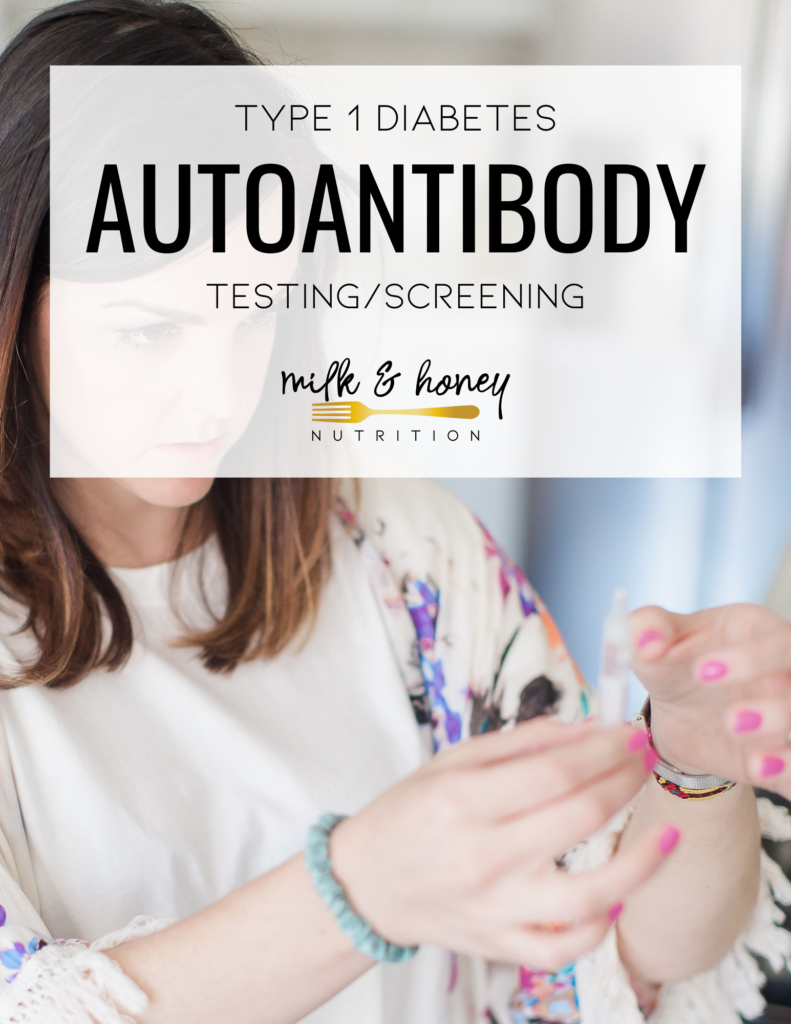
If you or a loved one is at risk of developing type 1 diabetes, talk to your doctor about early screening for type 1 diabetes autoantibodies.
Medical technology and screening practices have come a long way in the last 20 years. Type 1 diabetes autoantibodies testing can detect type 1 diabetes before symptoms are present and potentially prevent life-threatening medical complications.
This blog post was developed as part of a sponsored campaign with Provention Bio, Inc.® Type1Tested.com is brought to you by Provention Bio. This article is not intended to provide medical advice, diagnosis, opinion, treatment or services. This article and the links contained in it provide general information for educational purposes only. The information provided in this article is not a substitute for medical care. It should not be used in place of the advice of your physician.
Type 1 diabetes is an autoimmune disease
Type 1 diabetes happens when a person’s immune system attacks the beta cells (we’ll discuss what these are later on) in the pancreas. These beta cells produce insulin needed to digest carbohydrates, and process glucose produced by the liver. Without insulin from the pancreas, this person would die. Before 1921 when insulin was discovered, type 1 diabetes (known as the “wasting disease” at the time) was a death sentence.
Now though, people can go on to live healthy thriving lives with type 1 diabetes by injecting insulin daily. Most people, however, get very sick before realizing they have developed type 1 diabetes. This can result in life threatening situations and expensive, crippling medical bills.
Below we will discuss who is most at risk for developing type 1 diabetes and the benefits of testing for type 1 diabetes autoantibodies. One of the most important benefits of this blood test is that it can detect type 1 diabetes before there are symptoms.
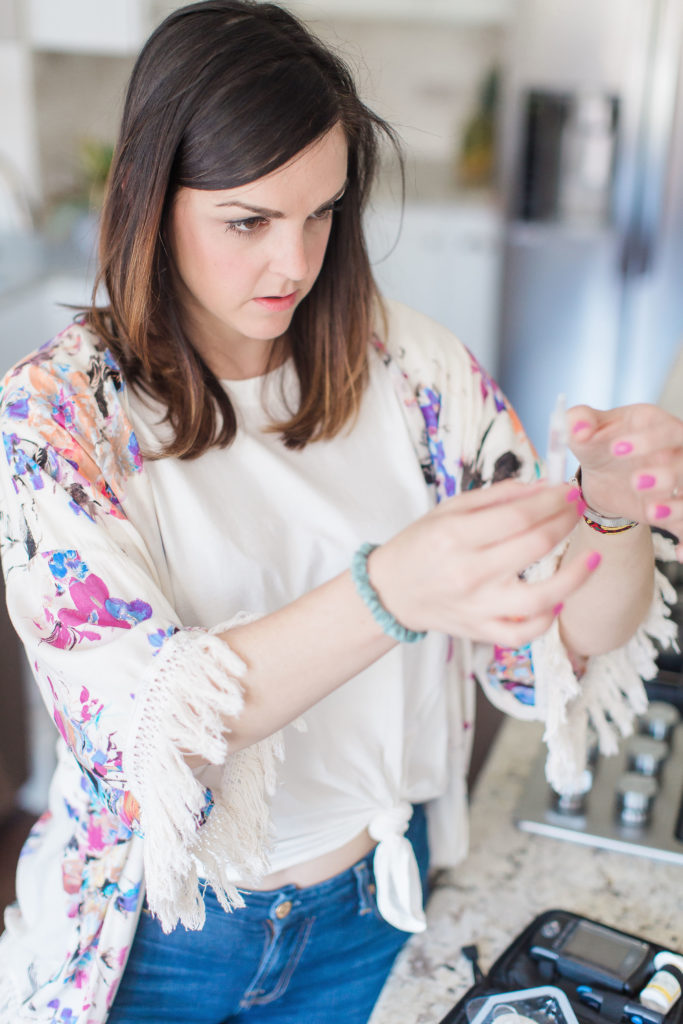
My own family history of diabetes
If you follow me on social media, or have read any of my other blog posts, you know I myself have type 1 diabetes. But, do you want to guess how many other people in my family have type 1 diabetes as well? Go ahead, I’ll give you a second to think. (Hint: Most people have at least, 1 other family member with type 1 diabetes.)
Follow my journey on social media.
I have FOUR other relatives who have type 1 diabetes: my mom, my aunt (mom’s sister), my uncle (mom’s sister’s husband), and my nephew (brother’s son). It’s safe to say we’ve got some genetic risks at play here.
My aunt (mom’s sister)
My aunt was diagnosed first in the early 1980s when she was in her late 20s. Doctors initially thought she had type 2 diabetes. She was put on oral meds, but they weren’t working. After many months of frustration and not feeling well, she was eventually diagnosed with type 1 diabetes and started on insulin. (This is most likely what we would call Type 1.5, or LADA, today.) Had autoantibody testing for type 1 diabetes existed back then, she could have avoided months of not feeling well and trying out useless medications.
My mom
My mom was diagnosed a few years after her sister while she was pregnant with me actually. Doctors initially thought she just developed gestational diabetes early in her pregnancy. They noted it was odd that she needed insulin so quickly and in such high amounts for someone in their first pregnancy, with no detectable risk factors. But, she made it through the pregnancy and gave birth to a healthy baby girl… aka, me.
As with all cases of gestational diabetes, they told her that as soon as she gave birth she could go back to eating a regular diet and not taking insulin. While she was in the hospital after having me, she was craving ice cream and asked my dad to go get her some because she hadn’t had any in so long. She enjoyed her ice cream, but quickly found her blood sugar skyrocketing through the roof. Shortly after that she was diagnosed with type 1 diabetes.
Me
Fast forward five years later, my mom has now also given birth to my little brother with no complications. Shortly after I turned five, my mom noticed I had lost weight, was all of a sudden wetting the bed again, and had developed a yeast infection. (Yeast infections are common in young girls and women with elevated blood sugars.) She immediately tested my blood sugar once she put all these things together and realized what was likely happening. The meter read over 300 mg/dL!
She immediately called my pediatrician thinking they would tell her to take me to the hospital or bring me right in. Unfortunately, the pediatrician did not believe her. So like any good mother, she marched right up to that office and tested my blood sugar right in front of them. After many apologies, they told her to take me straight to the local children’s hospital to be admitted.
We stayed there for 4-5 days while they figured out my insulin doses, and my parents wrapped their head around not only my mom having type 1 diabetes but now their oldest child. If type 1 diabetes autoantibody testing had been available back then, we could have possibly avoided a hospital stay and all the negative symptoms I was experiencing prior to then.
My uncle (mom’s sister’s husband)
While not blood related, I do think it’s ironic to note that my mom’s other sister, who does not have type 1 diabetes, married a man who also has type 1 diabetes! It’s safe to say he fits in perfectly with our family! I don’t know his diagnosis story, but writing this article makes me want to ask him.
My nephew (brother’s son)
My nephew’s diagnosis story is definitely the one that will help you see the benefits of type 1 diabetes autoantibody testing the most. In my mind, since my brother had never developed type 1 diabetes and was now well into his 30s, I just assumed it would be my kids who would get it one day and not his.
But in the summer of 2020 my nephew had just turned two years old, and my brother and sister-in-law took him to the emergency room for what they thought was some sort of virus that he just couldn’t get rid of. Within minutes of hearing his family history, they tested his blood sugar only to find out he was in severe DKA (diabetic ketoacidosis) and would spend the next week in the hospital recovering as my brother and sister-in-law learned how to care for a small child with type 1 diabetes. I’m sure you can see how his story might have looked different if we had known about how readily available type 1 diabetes autoantibodies testing is these days.
(He is now almost 4 years old and is healthy and just the happiest, most joyful little boy you’ve ever met. My brother and sister-in-law, along with my mom and dad, and every other type 1 diabetes parent, are true heroes.)
What are diabetes autoantibodies?
OK, so now that you have a better understanding of why I am a strong advocate for type 1 diabetes testing, let’s cover some definitions we need to be aware of.
What are type 1 diabetes beta cells?
Beta cells live in your pancreas and are responsible for producing insulin. When someone
develops type 1 diabetes, their immune system decides to attack the beta cells and as a result their body cannot produce insulin needed to live.
Autoantibodies definition
Diabetes autoantibodies are proteins that are present when beta cells are attacked. Since scientists have now discovered that beta cell damage can appear before someone would even notice symptoms, testing for these proteins could detect type 1 diabetes much earlier than was previously possible.
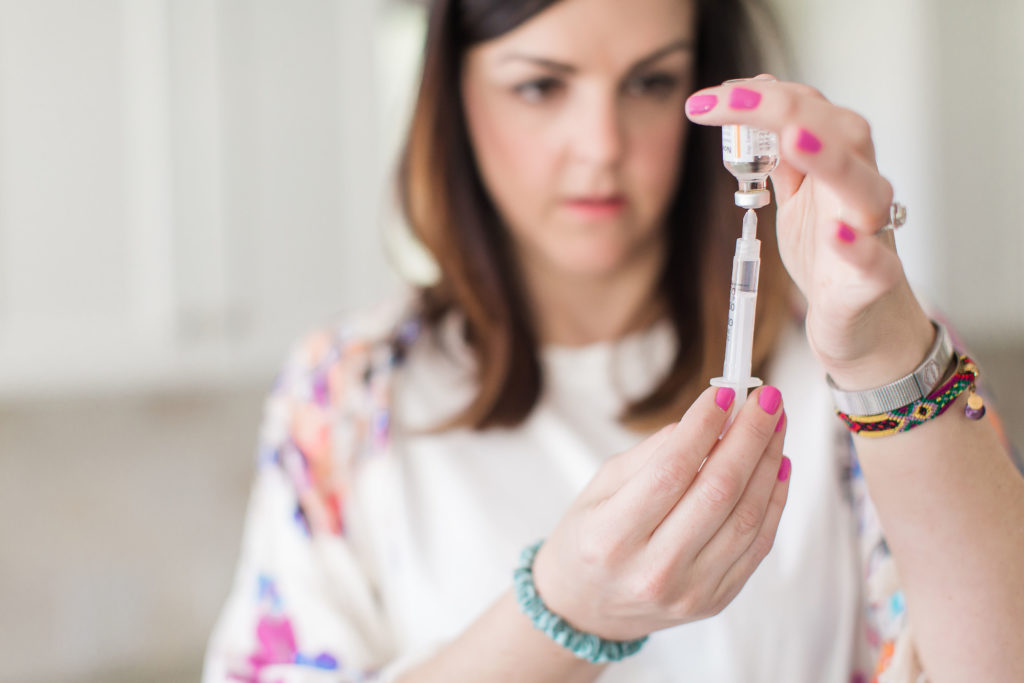
Stages of diabetes (type 1)
There are three stages of type 1 diabetes. Stages 1 and 2 are called “pre–insulin–dependent” type 1 because the body can still make enough insulin to keep blood sugars mostly within desirable ranges. Stage 3 occurs when the body cannot make enough insulin to keep blood sugars in range and an outside source of insulin must be introduced.
Stage 1 type 1 diabetes
Two or more autoantibodies are present and beta cell loss begins. Blood sugars are still normal, and there are no visible signs or symptoms.
Stage 2 type 1 diabetes
Two or more autoantibodies are present, and beta cell loss continues. Blood sugar levels become abnormal, but there are still no visible signs or symptoms.
Stage 3 type 1 diabetes
Two or more autoantibodies are present, and the body is no longer able to make enough insulin. Noticeable symptoms start to appear. Life-threatening complications like diabetic ketoacidosis (DKA) can occur.
Types of autoantibodies to test for
There are several types of autoantibodies that can be tested for.
Insulinoma-Associated-2 Autoantibodies (IA-2A)
IA-2A, or insulinoma-associated-2 autoantibodies form against a specific enzyme in the beta cell.
Anti-GAD Autoantibodies (GADA or Glutamic Acid Decarboxylase Autoantibodies)
Anti-GAD or GADA autoantibodies are formed against an enzyme called glutamic acid decarboxylase.
Islet Cell Cytoplasmic Autoantibodies (ICA or sometimes called “islet cell antibodies”)
Islet cells are clusters of cells in the pancreas that produce many hormones, including insulin. About 80% of people with type 1 diabetes will have islet cell autoantibodies, or islet cell cytoplasmic autoantibodies (ICA).
Insulin Autoantibodies (IAA)
These autoantibodies target insulin and are early markers for diabetes-related autoimmunity.
Zinc Transporter 8 Autoantibodies (ZnT8Ab)
These autoantibodies target enzymes that are specific to beta cells.
Risk factors, signs, and symptoms of type 1 diabetes
Common risk factors for type 1 diabetes include:
- Family history
- History of certain viral infections
- History of other autoimmune conditions
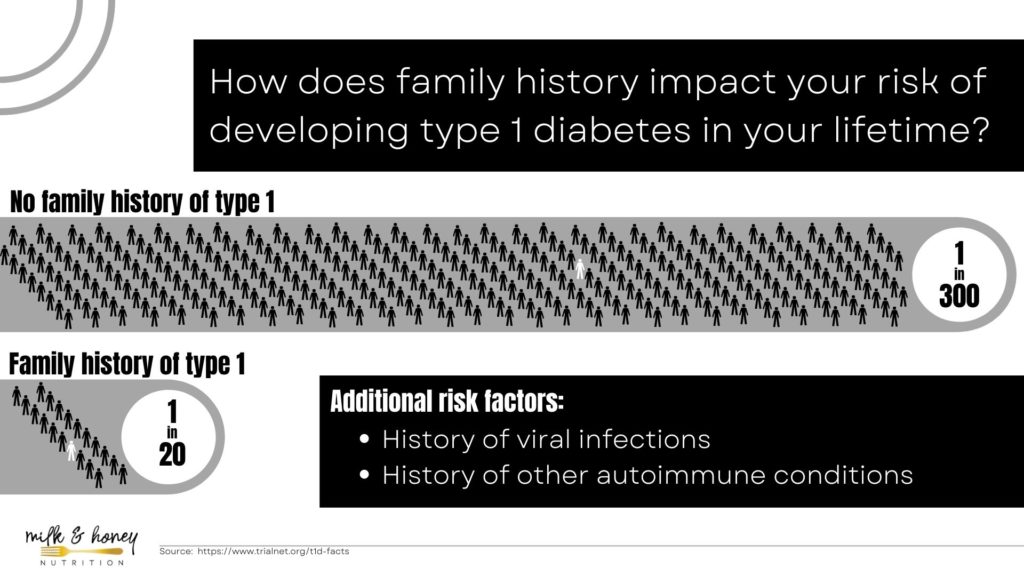
Family history is arguably the biggest risk factor for developing type 1 diabetes. The odds of developing type 1 diabetes with no family history is 1 in 300 people. But, the odds of developing type 1 diabetes if you have a family history are 1 in only 20 people. This means you have up to a 15x greater risk of developing type 1 diabetes if you have family history.
Common symptoms of type 1 diabetes include: frequent urination, excessive thirst, unintended weight loss, irritability and other mood changes, fatigue and weakness, and blurred vision.
Testing my children for type 1 diabetes autoantibodies
In spite of everything I’ve shared with you in this article, I was actually hesitant to test my children at first because I had a very outdated understanding of what type 1 diabetes testing included. Previous type 1 diabetes screening tests were actually genetic tests that looked at specific markers that we weren’t really certain did or did not indicate type 1 diabetes.
Type 1 diabetes autoantibodies testing is NOT a genetic test. It tests for the presence of autoantibodies that develop when beta cells have already started to be attacked. Once I properly understood this, I was very eager to start testing my kids yearly given our strong family history of type 1 diabetes.
Who should test for type 1 diabetes autoantibodies?
Given our strong family history, my kids are prime candidates for regular type 1 diabetes testing.
If you or your child has a family history, history of viral infections, or other autoimmune conditions they could benefit from type 1 diabetes testing. Talk to your doctor about whether or not early type 1 diabetes screening is right for your family and what the best testing option is for you.
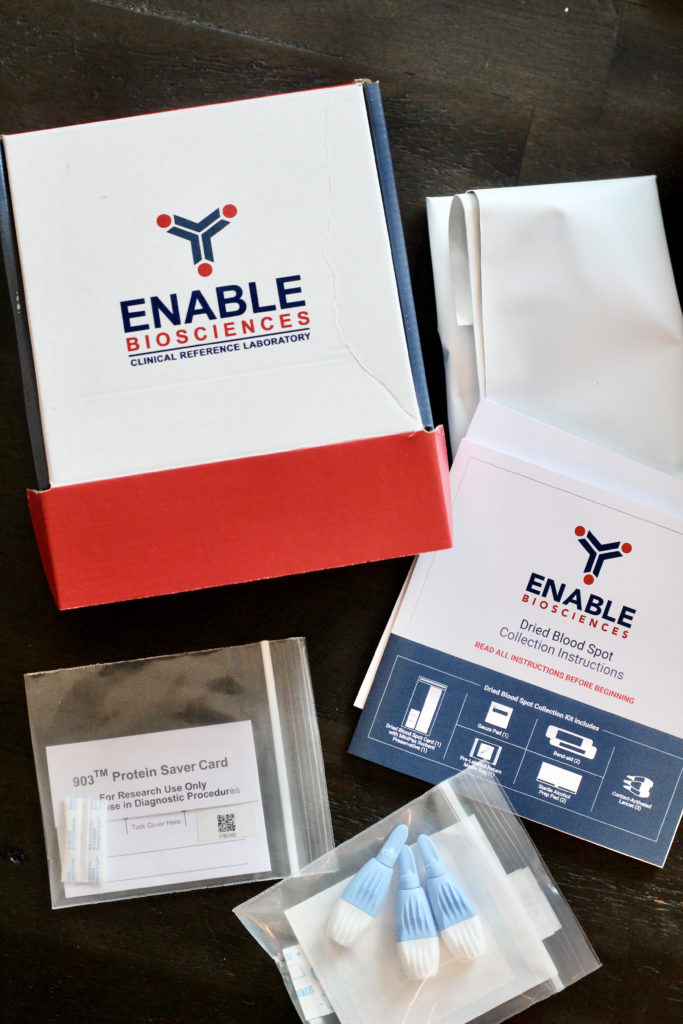
What is involved in the autoantibody test for type 1 diabetes?
Several different ways to get tested exist. These range from finger pricks to blood draws, and at-home tests to lab visits. Check out which testing option is the best fit for you.
I chose an at home test that involved a simple finger prick. The test kits and everything I needed was mailed to me after I ordered them online. We did the test really quickly at home with my oldest daughter and followed the instructions given to mail in her sample. It took about two weeks to get her results back. They were available online which made getting results super convenient.
My youngest daughter was more anxious about the test than my oldest, so I took her to a local lab to have them help me administer the test. Once we had collected her sample, we mailed it off just like I did my oldest daughter’s sample.
Type 1 diabetes autoantibodies test results: what do they mean?
There are three possible results categories you could receive back:
- If two or more autoantibodies are present, you should talk to your doctor. This is a sign that the earliest stages of type 1 diabetes have begun, but there is action that you can take now. Monitor for symptoms of type 1 diabetes, begin testing blood sugar, and begin the search for the right doctor and care team for you or your child.
- If the test detects one autoantibody, you are at a higher risk for developing type 1 diabetes, and should talk to your doctor about getting screened yearly to see if additional autoantibodies develop.
- If no autoantibodies are present, you may want to talk to your doctor about getting re-screened every year if you have a family history of type 1 diabetes.
Benefits of getting tested for type 1 diabetes
Getting tested for type 1 diabetes will not prevent you or your child from developing it. But, it will allow you to be one step ahead and prevent possible life-threatening complications. Knowing if you or your child is in the early stages of T1D better prepares you to recognize symptoms when they do appear.
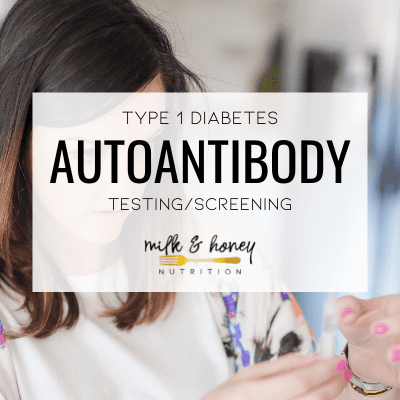
Type 1 diabetes brings on a whole new set of responsibilities with a big learning curve that can be overwhelming at times. Getting tested now and knowing if you or your child will become insulin dependent allows you to start developing the skills needed to manage and THRIVE with type 1 diabetes!
Talk to your doctor about getting tested for type 1 diabetes autoantibodies
To start, talk with your doctor about getting tested for type 1 diabetes autoantibodies. And, visit Type1Tested.com to learn about the many testing options available and what is right for you and your family.






One Response
Thanks for sharing this! My 7 year old son went into DKA in December and was diagnosed. He also tested positive for Covid during his hospital stay. We did the the autoantibody testing for my 3 girls and my 10 year old daughter had 3/3 autoantibodies and was diagnosed just 6 weeks after my son was diagnosed. We are not sure if she ever had Covid. It was devastating and shocking as we have no family history of Type 1 or any known autoimmune in our family. My daughter would be in stage 2 currently. She wears a dexcom but we tried insulin and she was too sensitive. I think it’s very soon and may start a basal dose. She goes high after meals but still comes down. We have been told that it will be a virus or the start of puberty that will be her full onset. Thanks for sharing this article. It was so hard to find information about this and we felt alone! Thanks for your helpful insight you share!